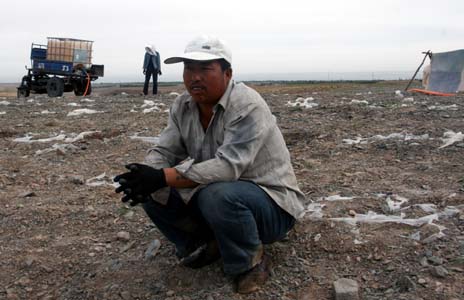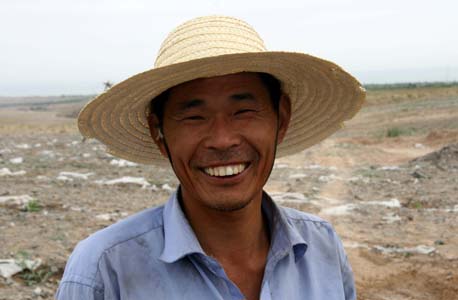A short drive from Zhongwei City in the south of northwest China's Ningxia led across the Yellow river, past bright green paddy fields and silver-blue poplars towards a Buddhist temple perched precariously on a crumbly loess cliff. The road snaked up the cliff to a lush plain planted with fruit trees and dotted with Hui Muslim villages. After fifteen minutes we reached the fringes of the Gobi desert, passing a few brick kilns on the way before arriving at a dusty barren spot with the improbable name of Fragrant Mountain, where we happened upon Mr. Zhang on his watermelon farm.

Mr. Wang, a farmer on the Fragrant Hills Water Melon Park, earns tens of thousands of yuan a year from his watermelon crop planted in dry, sandy soil on the edge of the Gobi desert near Zhongwei City, Ningxia Hui Autonomous Region.
Mr. Zhang's land is on the edge of the desert, and seems on the face of it impossible to cultivate, but he told us he makes "tens of thousands” of yuan per year from his 50 mu (3.3 hectares) of land planted with watermelons. Because he uses no chemicals, his watermelons are classed as an organic product and he can demand a premium price of around 4.5 yuan per jin (1 jin = 0.5 kilos). He told us has even signed a contract to supply watermelons to the Olympic Games.

Mr. Dong is building an ornamental gate at the entrance to Fragrant Hills Water Melon Park, an experimental watermelon growing project set up in 2004 by the government of Zhongwei City, Ningxia Hui Autonomous Region.
Nearby, we spoke to Mr. Dong who is helping build an ornamental gate to mark the entrance to Fragrant Mountain Watermelon Park. The Zhongwei City government opened the Fragrant Mountain site in 2004, as part of a wider project to encourage the growing of watermelons on marginal land. As of 2007, Zhongwei had 685,100 mu of sandy land under cultivation growing water melons, and 17,980 rural households had joined in the business. Gross production reached 700,000 tons, a yield of 1,080 kilograms per mu. The business as a whole earned 405 million yuan, accounting for 10.49 percent of total agricultural earnings in Zhongwei. Average earnings per participating household reached 12,054 yuan.
No fertilizers or pesticides are used to grow the water melons. Zhongwei's melons have been recognized by the central government as a grade-A organic product, and 95 percent of them are sold to other provinces.
Both Mr. Dong and Mr. Zhang seemed happy with the way things have turned out. Of course, in the world of farming nothing is certain, "If it doesn't rain we're scuppered” said Mr. Zhang, grinning.
(China.org.cn by John Sexton and Pang Li, July 21, 2008)